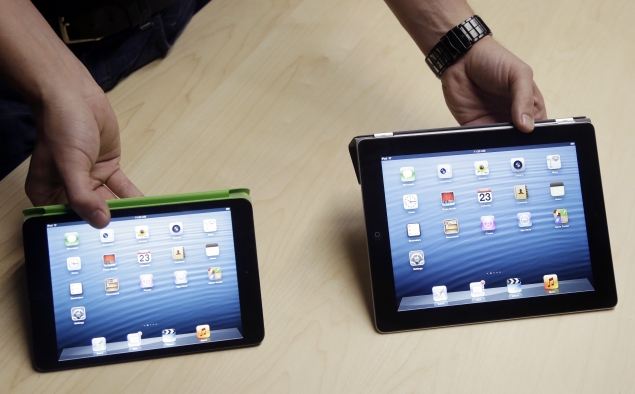- Home
- Tablets
- Tablets News
- Global tablet sales surge as Apple continues domination, Microsoft Surface disappoints
Global tablet sales surge as Apple continues domination, Microsoft Surface disappoints

The preliminary survey by business research firm IDC showed the tablet market grew 75.3 percent year over year in the quarter. and rocketed 74.3 percent from the previous quarter's total of 30.1 million.
IDC said the strongest growth came from Android, including tablets made by South Korea's Samsung and Taiwan's Asus, which makes a Google-branded Nexus tablet.
Apple remained the biggest seller, but its market share was under 50 percent, IDC said.
The survey found that Microsoft, which launched its new Surface tablet in the quarter, failed to break into the top five sellers and shipped a modest 900,000 of the devices in the quarter.
Overall, the market's strong gains came from a spate of new product launches, including the iPad mini, and lower prices, which encouraged buyers over the holiday shopping season, IDC said.
"We expected a very strong fourth quarter, and the market didn't disappoint," said IDC analyst Tom Mainelli.
"The record-breaking quarter stands in stark contrast to the PC market, which saw shipments decline during the quarter for the first time in more than five years."
Apple's iPad held its top position with 22.9 million units shipped. That was up 48 percent from a year earlier, but lower than overall market growth.
As a result, Apple's market share declined for a second quarter in a row to 43.6 percent from 46.4 percent in the third quarter.
Samsung, the number two vendor, saw year-on-year growth of 263 percent, selling 7.9 million tablets and grabbing a 15.1 percent percent market share.
IDC said Amazon, which does not provide its own sales data, delivered some six million tablets in the quarter to retain its spot as the number three vendor.
That represented 26.8 percent growth, giving Amazon a market share of 11.5 percent, IDC said.
Fourth place belonged to Asus, which sold 3.1 million tablets, year-on-year growth of more than 400 percent. That gave the Taiwan-based firm a 5.8 percent market share.
Barnes & Noble sold one million of its Nook tablets and accounted to 1.9 percent of the market, the survey found.
IDC analyst Ryan Reith said Microsoft will need to shift its strategy to compete better in the tablet market.
"There is no question that Microsoft is in this tablet race to compete for the long haul," he said, calling the market reaction to Surface "muted."
"We believe that Microsoft and its partners need to quickly adjust to the market realities of smaller screens and lower prices. In the long run, consumers may grow to believe that high-end computing tablets with desktop operating systems are worth a higher premium than other tablets, but until then (selling prices) on Windows 8 and Windows RT devices need to come down to drive higher volumes.
Tablets at CES 2013
For the latest tech news and reviews, follow Gadgets 360 on X, Facebook, WhatsApp, Threads and Google News. For the latest videos on gadgets and tech, subscribe to our YouTube channel. If you want to know everything about top influencers, follow our in-house Who'sThat360 on Instagram and YouTube.
Related Stories
- Samsung Galaxy Unpacked 2025
- ChatGPT
- Redmi Note 14 Pro+
- iPhone 16
- Apple Vision Pro
- Oneplus 12
- OnePlus Nord CE 3 Lite 5G
- iPhone 13
- Xiaomi 14 Pro
- Oppo Find N3
- Tecno Spark Go (2023)
- Realme V30
- Best Phones Under 25000
- Samsung Galaxy S24 Series
- Cryptocurrency
- iQoo 12
- Samsung Galaxy S24 Ultra
- Giottus
- Samsung Galaxy Z Flip 5
- Apple 'Scary Fast'
- Housefull 5
- GoPro Hero 12 Black Review
- Invincible Season 2
- JioGlass
- HD Ready TV
- Laptop Under 50000
- Smartwatch Under 10000
- Latest Mobile Phones
- Compare Phones
- Moto G15 Power
- Moto G15
- Realme 14x 5G
- Poco M7 Pro 5G
- Poco C75 5G
- Vivo Y300 (China)
- HMD Arc
- Lava Blaze Duo 5G
- Asus Zenbook S 14
- MacBook Pro 16-inch (M4 Max, 2024)
- Honor Pad V9
- Tecno Megapad 11
- Redmi Watch 5
- Huawei Watch Ultimate Design
- Sony 65 Inches Ultra HD (4K) LED Smart TV (KD-65X74L)
- TCL 55 Inches Ultra HD (4K) LED Smart TV (55C61B)
- Sony PlayStation 5 Pro
- Sony PlayStation 5 Slim Digital Edition
- Blue Star 1.5 Ton 3 Star Inverter Split AC (IC318DNUHC)
- Blue Star 1.5 Ton 3 Star Inverter Split AC (IA318VKU)













